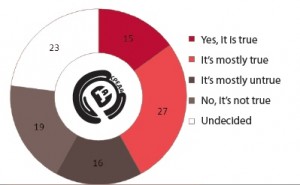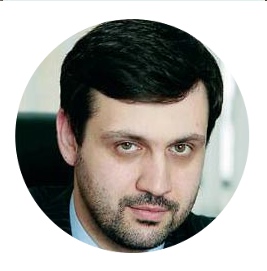Church censorship in the media
09/30/2011The results of the All-Russian representative survey conducted by the service SREDA (field work: Public Opinion Foundation “PENTA”, sample 1500 people)
42% of Russians believe censorship of the media by the Russian Orthodox Church is acceptable. Most often these are parents of two or more children, educated seniors, residents of the Central Federal District and Russians who describe themselves as happy.
On the contrary, those against the censorship of the church are: half of Moscow inhabitants, as well as the most affluent respondents.
Political party preferences of respondents, surprisingly, do not affect their attitude towards censorship.
As for the Orthodox, the non-churchgoers are distinguished by a slightly less tolerant attitude than in Russia on average, towards censorship by the church; and as the involvement in parish life increases, so does the tolerance regarding church censorship of the media.
Do you find the following statement true or false? “Censorship of the media by the Russian Orthodox Church is acceptable.”
Against church censorship of the media voted 35% of respondents. Men are slightly more likely than women to oppose church censorship in the media.
Media does not require censorship of the church: this is mostly believed by affluent citizens (who can afford to buy a car).
Interestingly, censorship of the media by the Russian Orthodox Church more often than the average does not interest young people under 25 and citizens of 45 – 50 years old. Young people more often are undecided. But people over 65 rarely consider such censorship unacceptable, even in spite of their Soviet Union communism past.
Most likely to speak against any church control of the media are Russians with higher and secondary vocational education. But those who have education “below secondary school” are the least likely to say that the Church must not censor the media.
The attitude regarding the acceptability of church censorship in the media differs among residents of large cities and towns. Respondents from towns with less than 250 thousand people, as well as rural residents, more frequently accept church censorship in the media. In large cities and metropolitan areas people, people are more likely to say that such censorship is not needed. This is especially true in Moscow: half of respondents spoke about the unacceptability of any church censorship.
Noticeable differences are also noted across the federal districts. Favorable responses to church censorship are more often expressed by residents of Central Federal District (46%), as well as those from Volga Federal District, despite the large proportion of the Muslim population living in these areas. Those against censorship are the inhabitants of the Northwest Federal District (which is home to the largest number of Russian Orthodox Christians who do not belong to the Russian Orthodox Church) and Ural federal district.
“High-resources” citizens (by the POF typology) often say that church censorship of the media should not be allowed. But “medium- resources” retirees (i.e., the same “high-resources” Russians from the recent past, but with more life experience and now lower incomes) are more often in favour of such censorship.
The Orthodox also respond in favour of church censorship of the media (50%), especially those who regularly partake in Communions (55%). But non-churchgoing respondents do not find censorship acceptable: more frequently than on average they respond that it’s not acceptable.
Out of all the respondents, Muslims most often struggled to give a definitive answer.
It may sound strange, but it turns out that political party preferences do not have a particular impact on attitude towards church censorship of the media. With this said, those who are going to vote at presidential elections 2011 – 2012 display a more positive attitude toward the possibility of media censorship by the Russian Orthodox Church. Citizens who had not yet decided on their electoral behaviour most often spoke against such censorship.






